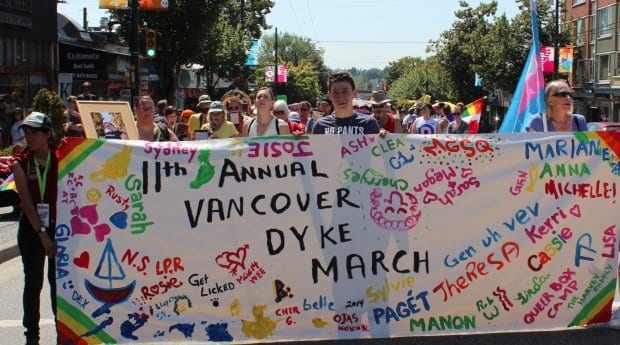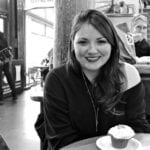Jayne Morgan is standing at the foot of the road that borders McSpadden Park, draping a rainbow flag over her shoulders as she excitedly prepares for the 11th annual Vancouver Dyke March. She says she’s been attending the march since she came out seven years ago.
“I come to see people, to celebrate who I am and who I’m with,” she says. Morgan and her partner make the trip from Langley, which she describes as more conservative than Vancouver.
Michelle Fortin, president of the Vancouver Dyke March, says that approximately 300 attendees come from outside Vancouver.
“I always look forward to see the new folks that arrive that have never experienced the Dyke March before. Oftentimes, people come from small towns, in the Interior or from out of province,” she says. “For example, we’ve got someone coming in from Lethbridge, where they don’t even have a Pride parade.
“I love experiencing the look on people’s faces when they just have all these lesbians in one place, and allies, and it’s all about celebration,” she says.
Just as Morgan’s rainbow cape settles into place, the mass that has congregated in the park, consisting of approximately 500 people, are called to line up behind the band that will lead the march up Commercial Drive. There is a scattering of signs sprinkled among the group, and while the march appears less political than similar events in other cities, such as the Toronto Dyke March, there are a few individuals who take the opportunity to make statements.
Janine Solanki holds a sign that says “Free Chelsea Manning, Queer Hero.” Manning was named the honorary grand marshal of the San Francisco Pride parade this year following last year’s controversial decision by the San Francisco Pride board to grant then revoke the title from Manning. Manning is a trans woman and American soldier who was detained after releasing military documents and who is now seeking access to hormone therapy and the rights granted to female prisoners.
“I think this is a cause that a lot of people in the queer community around the world are taking up,” Solanki says, adding that the Dyke March is a good space to encourage dialogue about social justice issues.
The band begins to play a rendition of Journey’s “Don’t Stop Believin’,” which seems fitting for Solanki and the other more political attendees.
The march slowly works its way from McSpadden Park along 5th Avenue, then turns north on Commercial Drive, ending at Grandview Park. There is minimal police presence, with only a couple of officers controlling traffic. People of all ages are participating, notably many families with young children, who later enjoy the shade and the playground at the back of the park.
“For us, we’ve always had this festival portion. So an opportunity to gather, an opportunity for artists to be together . . . This year, we actually kind of toned it down a little bit,” Fortin says. “We’ve got drag kings and burlesque and a slam poet I’m really excited about.”
Community organizations, including the Queer Film Festival and Queer Box Camp, are present, and attendees sprawl across a slight hill to watch the various performers take the stage.
This year marks Kate Reid’s eighth performance at the Dyke March. She says the march remains an important event because queer women need more visibility and because it serves as a less corporate march where queer people can have a more accessible space.
“I love this festival because it’s its own little community; it feels different from the big festival because it feels more grassroots,” Reid says. “I love that there’s tons of different people here, watching and participating. I love that there’s tons of women not wearing shirts and people being free to express themselves.”


 Why you can trust Xtra
Why you can trust Xtra


